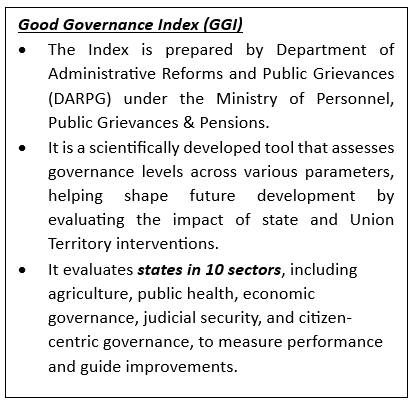Context:
Good Governance Day is observed annually on December 25 to honour the birth anniversary of former Prime Minister Atal Bihari Vajpayee.
More on the News

- In 2024, the theme is “India’s Path to a Viksit Bharat: Empowering Citizens through Good Governance and Digitalisation,” emphasizing the government’s commitment to technology and skill development to achieve the goal of Viksit Bharat by 2047 at an accelerated pace.
- On Good Governance Day, marking the 100th birth anniversary of former Prime Minister Atal Bihari Vajpayee, the Union Minister of State for Science and Technology, Earth Sciences, and PMO, launched the ‘Viksit Panchayat Karmayogi’ initiative.
About Good Governance Day

- In 2014, the Union government declared December 25 as “Good Governance Day” to honour the birth anniversary of former Prime Minister Atal Bihari Vajpayee.
- This day emphasizes that governance should focus on improving citizens’ lives, not just on administration, and highlights the principles of Accountability, Transparency, and Inclusive Growth, which were central to Vajpayee’s leadership.
- The celebration is part of Good Governance Week (Sushasan Saptah), which begins on December 19 and concludes on December 25.
- In 2021, during Amrit Mahotsav (75th Year of Independence), the government introduced Sushasan Saptah to promote the concept of good governance across the country.
- The ‘Good Governance Index’ was launched on 25th December 2019, on the occasion of Good Governance Day.
What is Good Governance?
- According to the Good Governance Index Report,
- Good Governance is defined as an effective and efficient process of decision-making. s
- It involves the implementation (or non-implementation) of decisions, with the amelioration of citizens as the topmost priority.
- The process includes resource allocation, the creation of formal establishments, and the establishment of rules and regulations, all of which contribute to achieving this goal
- According to the United Nations, good governance encompasses eight key characteristics: participatory, consensus-oriented, accountable, transparent, responsive, effective, equitable, and inclusive, all while adhering to the rule of law.
- Good Governance in Indian Tradition:
- In ancient India, kings were guided by Rajadharma, the ethical and moral principles of governance.
- Epics like the Mahabharata and Ramayana emphasize the qualities of an ideal ruler, such as justice, fairness, and prioritizing the welfare of the people.
- These timeless values still resonate today, reminding us that governance should always be rooted in integrity and compassion.
